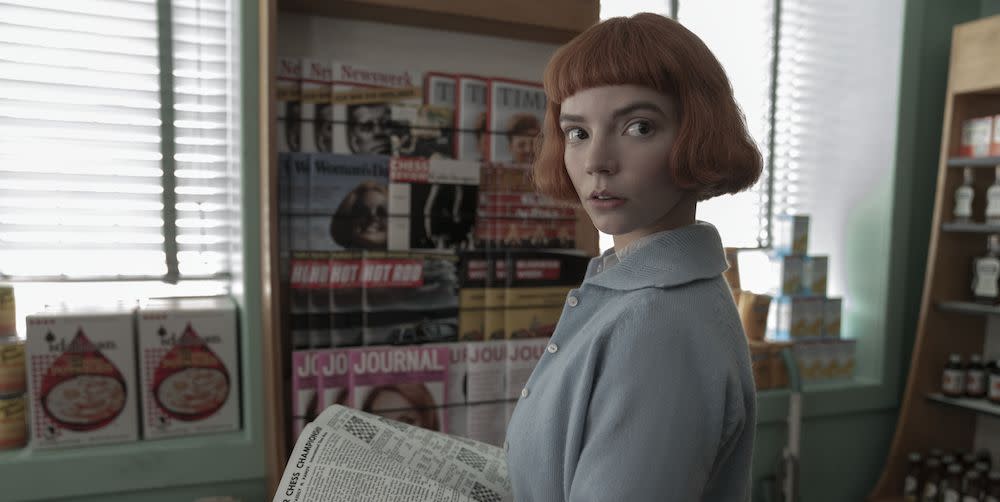Is Beth Harmon from 'The Queen's Gambit' Based on a Real Person?

The Queen's Gambit follows the rise of chess prodigy and orphan Beth Harmon, played by Anya Taylor-Joy.
As for whether The Queen's Gambit inspired by a true story? Sorry to disappoint: It's all fictional. But it is inspired by real-life events.
The limited series is based on the novel of the same name by Walter Tevis.
The Queen's Gambit is the most popular miniseries on Netflix to date. Translation? The fan club for Beth Harmon (played by Emma's Anya Taylor-Joy) is growing by the day, with viewers showing up to watch her chess matches in droves.
The only problem, of course, is that Beth Harmon is a wholly fictional creation. The Queen's Gambit is based on a 1983 novel of the same name by Walter Tevis (a chess player himself), and follows a chess prodigy on her journey from orphanage to championships. The series' title is a nod to one of the chess moves that Beth learns along the way.
Though the story is based on a single individual, it's certainly grounded in history. In a column for the New York Times, chess master Dylan Loeb McClain praised the series for capturing the atmosphere of the male-dominated chess scene in the '50s and '60s, when teenage Beth rises to fame, with "painful authenticity." He called the show "one of the best and most successful screen adaptations of the game."
With that in mind, here's what you need to know about the true stories behind The Queen's Gambit.

Beth Harmon is based on a combination of real chess prodigies, including Bobby Fischer.
In the acknowledgements of The Queen's Gambit, Tevis wrote that he was inspired by Grandmasters Robert Fischer, Boris Spassky, and Anatoly Karpov, all of whom were active in the chess scene in the '60s, when writing the novel. Notably, those figures don't appear in the book or the show—because they're incorporated into the fictional characters.
Of them all, Beth's career most resembles Bobby Fischer's. Born into a poor Jewish household in Brooklyn, Fischer ascended to becoming a household name through the game of chess. His list of accomplishments resembles Beth's: According to The Guardian, Fischer was the youngest U.S. master (at 14 years and five months), the youngest international grandmaster, and the youngest candidate for the world championship (at 15 years and six months), in his time.

Beth and Fischer have other similarities, in addition to being teenage talents. Both learned Russian to prepare for playing there. Both won the U.S. championship title in 1967. Both were tormented by inner demons—Beth by drugs, and Fischer by mental illness. Both were self-sufficient as teenagers.
But that's where the similarities end. As he grew older, Fischer was as equally defined by his enigma as he was by his chess skills. The Guardian summarizes his behavior, which garnered him a bad reputation within the chess community: "Fischer was labelled an insufferable diva and a psych-out artist who made life hell for tournament officials and tried to rattle opponents by complaining about, among other things, high-frequency sounds that only he and several species of mammals could detect."
However, the final episode of The Queen's Gambit, in which Beth plays Borgov (Marcin Dorociński) in Russia, clearly emulates Fischer's famous 1972 match against the USSR's Boris Spassky. The New York Times wrote about the match's significance: "Fischer’s victory was widely seen as a symbolic triumph of democracy over communism, and it turned the new champion into an unlikely American hero." Fischer walked away with the World Chess Championship—and then all but disappeared for 20 years, before re-emerging to play Spassky again in 1992.
By the time Fischer passed away in Iceland in 2008 at the age of 64, he had renounced his U.S. citizenship and had wholly devolved into paranoia. When he came back into the public eye, it was only to rant about the state of the world on radio shows, as NPR writes.
Let's hope Beth's story ends on a brighter note than Fischer's. However, The Queen's Gambit ends on an open-ended note, with no guarantee of a second season—so who's to say?

Walter Tevis also incorporated his struggle with addiction into The Queen's Gambit.
As a girl in the orphanage, Beth develops an addiction to a fictionalized sedative called xanzolam. For this aspect of her character, Tevis drew from his own experiences with drugs.
"When I was young, I was diagnosed as having a rheumatic heart and given heavy drug doses in a hospital. That's where Beth's drug dependency comes from in the novel," Tevis told the New York Times in 1983. "Writing about her was purgative. There was some pain—I did a lot of dreaming while writing that part of the story. But artistically, I didn't allow myself to be self-indulgent."

The show's chess matches are modeled off actual matches.
According to McClain's expert eye, the moves in the Beth's Queen's Gambit's matches are modeled off of famous competitions over the years—he cites a game in Riga, Latvia, in 1955, and a game at the Paris Opera in 1858 as examples.
Of course, chess novices in the audience (*raises hand*) would never recognize the parallels between the show's matches and real ones, but their correspondence demonstrates Netflix show's subtle intricacies.
Like the best sports movies and TV shows, a viewer doesn't need to know anything about the game to appreciate the story. By the end of The Queen's Gambit, I knew a little more about chess, but a lot more about the human spirit, and what people can overcome. Which is why ultimately, it doesn't matter that The Queen's Gambit is not based on a true story—it's based on a universal one.